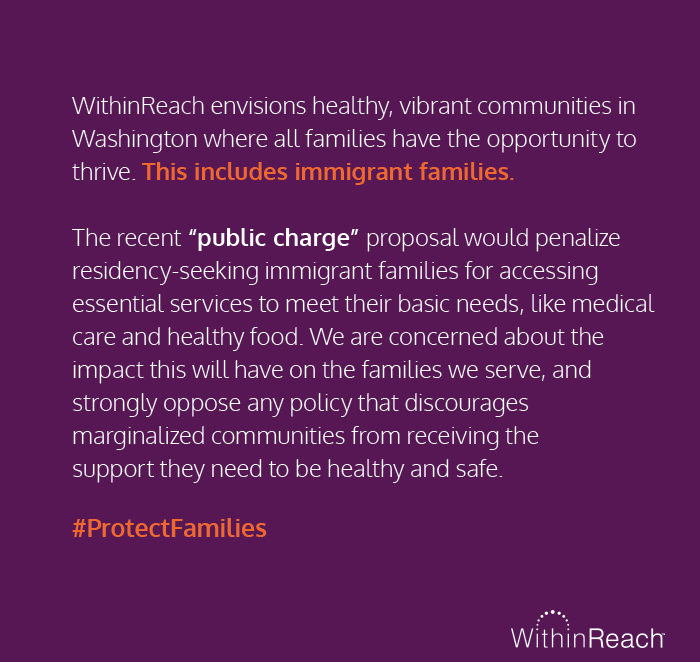December 10, 2018
Public Charge

WithinReach envisions healthy, vibrant communities in Washington where all families have the opportunity to thrive. This includes immigrant families. The recent “public charge” proposal would penalize residency-seeking immigrant families for accessing essential services to meet their basic needs, like medical care and healthy food. We are concerned about the impact this will have on the families we serve, and strongly oppose any policy that discourages marginalized communities from receiving the support they need to be healthy and safe.
With the public comment deadline quickly approaching on December 10th, we want to help everyone understand what “Public Charge” is and how it may negatively affect the health and well-being of families in our state.
What does “Public Charge” mean?
“Public Charge” is a term that is used to define an individual that relies primarily on services from the U.S. government as a main form of support. Under the current policy, the term only describes individuals accessing long-term institutional care or cash assistance, such as Supplemental Security Income (SSI) and Temporary Assistance for Needy Families (TANF). The reason that this term is getting attention in recent news is that the U.S. Department of Homeland Security is proposing to expand the definition of a “Public Charge” to include individuals currently or soon-to-be enrolled in:
- Medicaid
- Medicare Part D Low-Income Subsidy
- Supplemental Nutrition Assistance Program (SNAP)
- Section 8 Housing Choice Vouchers
- Section 8 Project-Based Rental Assistance
- Public Housing
When a person is entering the U.S. or attempting to change their documentation status, many factors determine eligibility. Under the proposed rule, a designation of “Public Charge” could negatively affect a person’s admission to the U.S. or lawful permanent residence. If passed, the expansion of the term would impact a person’s ability to eventually establish a safe, thriving and healthy future.
How will “Public Charge” affect the health of families in Washington?
Although some individuals, such as refugees, asylees, and lawful permanent residents applying for U.S. citizenship or naturalization will not be affected by this proposed policy; other immigrant families face losing the support they need to be healthy and safe.
Confusion and fear about the proposed policy changes are likely to have a “chilling effect”, and discourage families in need from seeking the support they need to thrive. This uncertainty is prevalent among the communities that our staff and partners serve. We believe that this feeling of uncertainty will put families at risk.
As of now, the proposed policy is not in effect and the federal government has not yet announced when it would become effective. If the proposed change passes it will not be retroactive. Meaning, if someone is currently enrolled in federally funded resources this would not negatively affect the process of changing their immigration status.
Individuals and families, in Washington State, who have questions or concerns about their immigration status due to this proposed policy can find resources on the Governor’s website or may contact one of the following organizations:
- CLEAR Hotline: 1-888-201-1014
- Northwest Immigrant Rights Project (NWIRP):
- NWIRP Seattle Office: 206-587-4009
- NWIRP Yakima Valley (Granger) Office: 509-854-2100
- NWIRP Wenatchee Office: 509-570-0054
How can I voice my opinion on the proposed “Public Charge” policy changes?
Whether it’s for yourself, your friends, family, neighbors, or those you work with there is a way to share your thoughts. Until December 10, anyone can submit a comment on “public charge” or issues surrounding the policy. Click here to leave a personalized message or story that clearly express your concerns.
WithinReach believes ALL FAMILIES deserve to be healthy. We worry that “Public Charge” will put the families we work with every day at risk of not receiving the basic needs and services they need to thrive.
Sources:
https://www.nilc.org/issues/economic-support/pubcharge/
https://www.doh.wa.gov/CommunityandEnvironment/HealthEquity/PublicCharge



